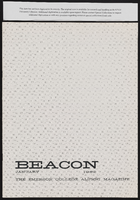Search the Special Collections and Archives Portal
Search Results
Frey, James H. (1941 June 29-)
James Frey was born in Eureka, South Dakota, in 1941. His father worked in creamery and his mother was a registered nurse. When Frey was nine, the family, including his twin sister, relocated in Sioux Falls where his dad was plant manager for a dairy. He joined the YMCA in the fourth grade and ended up working for them until around the age of 22. He attended Augustana College in Sioux Falls, graduating with a major in sociology and a minor in history. After graduation, he worked for three years at the YMCA in Sioux Falls as program director.
Person
George, Lloyd D., 1930-
Judge Lloyd D. George was born on February 22, 1930, in Montpelier, Idaho. He attended grade school and high school in Las Vegas, Nevada, and earned his bachelor’s degree from Brigham Young University in 1955. Later that same year, he entered the United States Air Force and worked as a fighter pilot in the Strategic Air Command. In 1958, he concluded his military service as a captain and in 1961, earned his Juris Doctor degree from the University of California at Berkeley.
Person
Nartker, Thomas A.
Thomas Nartker was born and raised in Dayton, Ohio. He attended grade school and high school there, and then attended the University of Dayton. He majored in chemical engineering. By the time Nartker was a sophomore in college, He had already been accepted for graduate study at the University of Tennessee.
Person
Urban, Ruth Pearson, 1948-
Ruth Pearson Urban was born in 1948 in Los Angeles, California. At the age of ten, she moved to Las Vegas with her mother and older sister. Urban spent most of her childhood in the Huntridge area and was always heavily involved with Temple Beth Sholom. After graduating from Las Vegas High School, Urban attended the University of Nevada, Las Vegas where she received a bachelor’s degree in social work, and later, a master’s degree in counseling.
Person
Decker, Clarabelle, 1900-1984
Teacher, librarian, and writer Clarabelle H. Decker was born Clarabelle Douglas in Bellevue, Colorado on November 03, 1900. She and her family moved to Oatman, Arizona, where Decker attended Northern Arizona State Teachers College (now Northern Arizona University) and received her Bachelor of Arts degree. She later earned a Master of Arts degree in English and School Supervision from the University of Washington, and a degree in library sciences from the University of Southern California.
Person
Richards, Mustafa, 1950-
Mustafa Richards was born December 24, 1950 in Detroit, Michigan. He graduated from Murray High School located in Detroit. Although he was accepted to Wayne State University, Richards opted out of attending college and started his journey towards his study of multiple religions.
Person
Rudiak, Gertrude, 1915-
Gertrude Rudiak was born August 2, 1915 in North Dakota to Russian immigrants. She grew up in Wisconsin until 1924. That year, her family drove to California via the Yellowstone Trail. Her father had a chiropractic practice in Los Angeles, California. After Rudiak earned a music degree at the University of California at Berkeley, she attended a business college, and she got a job as a social worker in northern California.
Person

